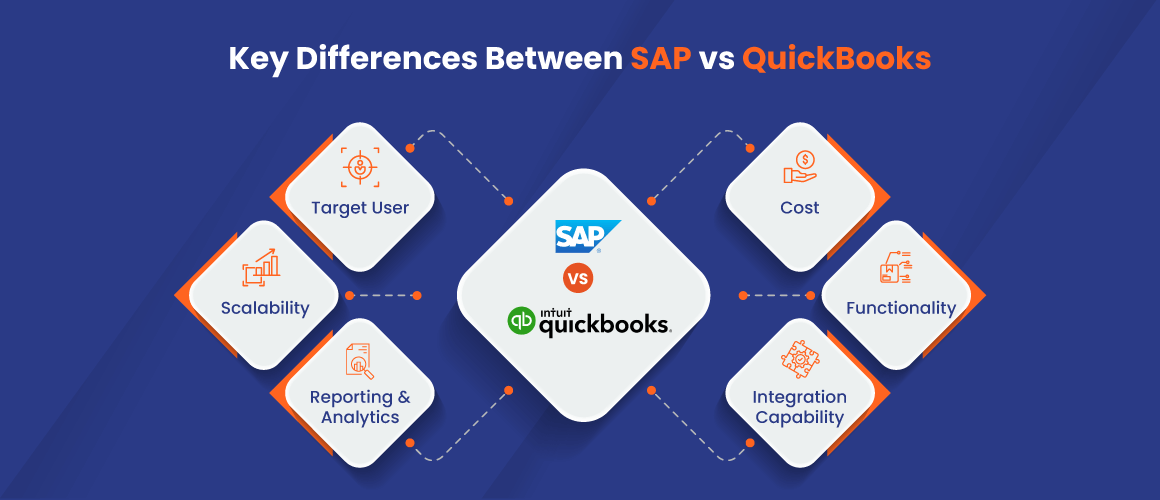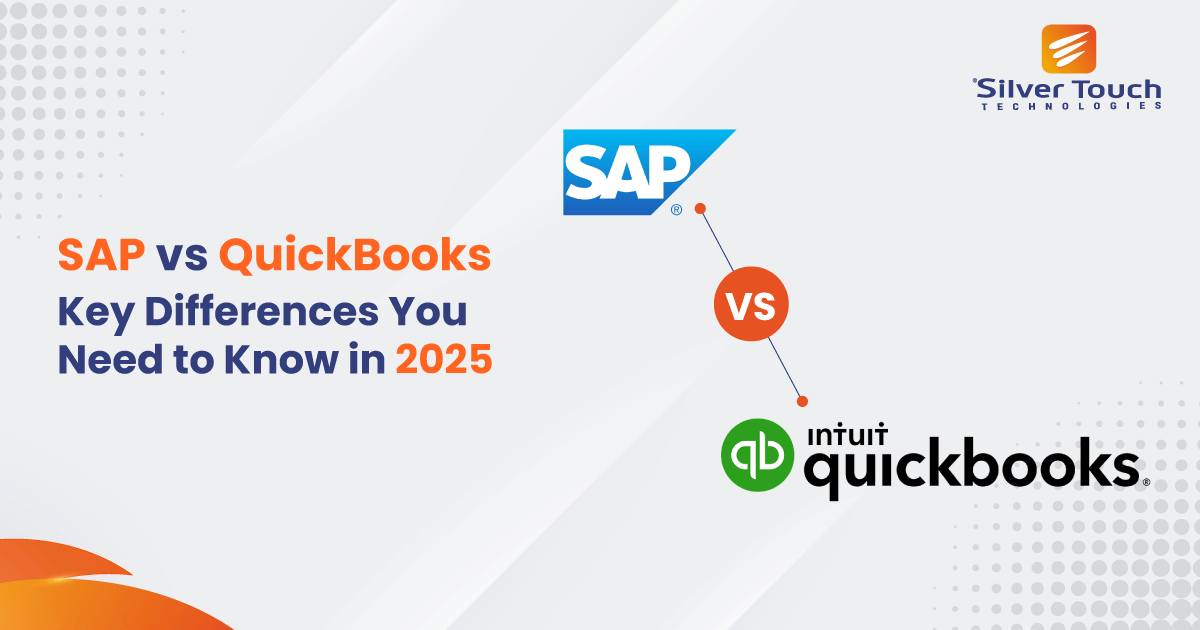Quick Summary: SAP Business One stands out as a powerful ERP solution that goes beyond basic accounting by integrating finance, inventory, sales, and customer management into one platform. It is highly scalable, supports advanced reporting and analytics, and adapts to the growing needs of SMEs. With features like cloud adoption, AI integration, and mobile accessibility, SAP Business One empowers businesses to streamline operations, improve decision-making, and drive sustainable growth.
Small and mid-sized businesses (SMBs) have limited accounting and other requirements. They need an easy-to-use and simple solution to meet these needs. Here, QuickBooks is a good option to start with for these businesses. Even startups can use QuickBooks software as an all-in-one system for handling basic accounting requirements. This post will compare SAP vs QuickBooks to select the right option for your business.
Let’s start with understanding the importance of SAP Business One, a comprehensive ERP solution, and QuickBooks for modern businesses.
Understanding SAP and QuickBooks Software
QuickBooks is an accounting software designed specifically for startups and small businesses to meet basic financial requirements. It is a popular business management solution with a user-friendly interface and simple navigation. Even non-accountants can manage finances using QuickBooks. It offers various plans at different prices and startups or small businesses find it useful. However, QuickBooks has only basic accounting features including invoicing.
On the other hand, SAP Business One is one of the most preferred ERP and business management solutions globally. It integrates various business functions including inventory and CRM with high scalability. As a comprehensive solution, SAP Business One software can handle various business processes of SMEs effectively. It has advanced reporting and analytics features for improving the decision-making process. SAP costs more than QuickBooks.
Key Differences Between SAP vs QuickBooks

It is fair to mention that QuickBooks is ideal for startups to very small enterprises and SAP Business Solution is designed for small and mid-sized enterprises. However, startups and even large companies can also use SAP B1 software. Let’s have a look at the key points of differences between SAP vs QuickBooks.
Target User
The target audience for QuickBooks is mostly startups and small businesses that have simple accounting needs. SAP Business One can address the needs of SMEs and growing businesses that have complex operations. For example, a startup with budget limitations and simple functions can opt for QuickBooks, but a small business with the potential to grow or expand should go for SAP Business One.
Scalability
QuickBooks has limited scalability and it is more useful for startups with small-scale operations. It may not fit to meet increasing requirements. SAP Business One solution, on the other hand, can handle large volumes of business operations. Moreover, it is capable of scaling up with growing business. It is quite possible that startups and small businesses need to switch to SAP Business One at a certain level.
Cost
QuickBooks has an upper hand over SAP B1 at this point. QuickBooks is budget-friendly and offers various packages that fit the requirements of startups. SAP Business One is a comprehensive software that needs a bigger investment. However, this investment can last for several years because SAP B1 can easily meet the complex and changing requirements of your growing enterprise.
Functionality
QuickBooks has all basic accounting functions including tracking sales and invoicing. SAP Business One, as a full ERP system, can handle various processes ranging from finances to inventory and customer relationships to production. Simply put, SAP B1 has useful features for all the departments. Moreover, SAP Business One enables companies to add the necessary customized tools to enhance functionality according to changing business needs.
Integration Capability
QuickBooks has limited capability for integrating with other business systems. It may not be suitable for implementing into a complex business system. This is not the case with SAP Business One solution. Companies can integrate seamlessly into the existing business system. Furthermore, this solution is capable of integrating with CRM and other business solutions to build a 360-degree network.
Reporting & Analytics
Here, SAP B1 is way more advanced than QuickBooks. All you get are basic reports like a simple P&L statement and invoice report with QuickBooks, whereas SAP B1 offers real-time reports and insights. SAP Business One offers detailed reports on sales, customer behavior, and inventory. You can get a detailed analysis related to the activities of all the departments with SAP Business One software.
Moreover, QuickBooks is easier than the SAP Business One solution and facilitates quick implementation. SAP B1 is a complex ERP solution and its implementation is resource intensive.
Here is a quick table showing the differences between QuickBooks vs SAP Business One
Aspects | QuickBooks | SAP Business One |
| Target Audience | Small businesses | Small to mid-sized businesses |
| Ease of Use | User-friendly | Highly complex |
| Scalability | Limited | High |
| Cost | Affordable | Expensive |
| Functionality | Basic Accounting | ERP |
| Integration | Limited | Seamless across business systems |
| Reporting | Basic | Advanced |
| Implementation | Quick | Resource-intensive |
How SAP Business One Offers More Scalability through Cloud Adoption
When we differentiate QuickBooks vs. SAP Business One, scalability remains a key aspect. SAP Business One, thanks to cloud adoption, offers enhanced scalability by providing a flexible and cost-effective way for businesses to grow. It enables businesses to get rid of on-premise hardware.
SAP Business One offers the Software as a Service (SaaS) model, and companies can scale resources up or down easily as per their changing requirements. This pay-as-you-go model is useful for adjusting user licenses, storage, and computing power on demand.
SAP Business One- User Experiences Enhancements
SAP Business One has brought significant user experience (UX) enhancements to improve efficiency, accessibility, and overall usability for modern businesses. These improvements focus on modernizing the interface and assisting users in making their daily tasks simpler and more intuitive.
Key user experience enhancements in SAP B1 include:
SAP Fiori-Style Cockpit
This is a modern, role-based user interface inspired by the SAP Fiori design language. It gives a clean, user-friendly dashboard with tiles and widgets so that users can get clear overview of their key business data and tasks. It helps streamline workflows and makes it easier for corporate users to navigate the system with fewer clicks.
Web Client
The new web client offers a browser-based, lightweight interface to ensure a consistent user experience between the desktop application and a web browser. It enables users to access and manage core business processes like sales, purchasing, and inventory from any device, anywhere, without the need for a local installation.
Microsoft 365 Integration
Integration of Microsoft 365 into SAP Business One can streamline collaboration and data sharing. Users can export documents and reports to Microsoft Word or Excel, and save them directly to OneDrive. This facilitates a more connected and efficient workflow for teams that rely on SAP and Microsoft tools.
Mobile App
The SAP Business One brings a dedicated mobile app for iOS and Android OS to offer on-the-go access to critical business information. It facilitates managers and sales teams to view reports, manage contacts, check inventory levels, and approve documents directly from their smartphones.
Apart from these features, interactive reports and analytics can improve user experience and assist companies in making meaningful decisions in real time.
How AI Integration Improves Decision-Making in SAP Business One
Integration of SAP Business One and AI enhances decision-making by transforming raw data into actionable, predictive insights. This revolutionary technology leverages machine learning to analyze vast amounts of data ranging from sales orders to customer interactions. It enables companies to identify different patterns and transition from a reactive to a proactive model.
AI can predict future customer demands, thereby enabling more accurate inventory planning and procurement. Furthermore, AI-powered features in SAP Business One are useful for automating routine tasks and giving intelligent recommendations directly within workflows. This reduces the manual effort for analyzing data and ensures that the employee can get the most relevant information.
For example, an AI assistant can generate sales forecasts and recommend optimal pricing strategies automatically. These data-backed insights are beneficial for making real-time and strategic decisions that drive efficiency.
Future of SAP Business One Solutions
SAP Business One focuses on cloud adoption and user experience while integrating advancements in emerging technologies. Talking about the future of SAP Business One software, we can expect that evolution in this solution will meet the more complex and diverse requirements of SMBs effectively. We can expect a better integration with other SAP solutions and the incorporation of AI for improving decision-making.
Ready to grow smarter
SAP Business One?
Contact usSAP Business One is expanding its cloud offerings to give greater flexibility and scalability to businesses. It is fair to mention that SAP Business One will become a growth driver for SMBs worldwide as a comprehensive ERP solution.
Conclusion
QuickBooks is mainly useful for startups and small businesses that have basic accounting needs. It has quick implementation but several limitations. SAP Business One is the right option for a growing company that performs complex operations and needs a robust solution. This difference between QuickBooks vs. SAP Business One will certainly assist you in choosing the most suitable option for your company. It is better to consult a reliable business solution provider to select the right software for your enterprise.
Silver Touch Technologies Canada is a reputed SAP Partner. Our in-house team of experienced professionals can assist startups, SMBs, and large enterprises to stay ahead of the competition through advanced SAP ERP solutions. Contact us to learn more about SAP Business One and other advanced solutions that can drive growth through transformation for your business.
FAQs
Yes, QuickBooks can handle several activities of large businesses through its enterprise solutions.
Yes, you can switch from QuickBooks to a more comprehensive ERP system, SAP as your business grows.
Both SAP and QuickBooks offer customer support but the availability and quality of this service are different.
QuickBooks is available in cloud-based and desktop version, but QuickBooks Online is the cloud-based option.



